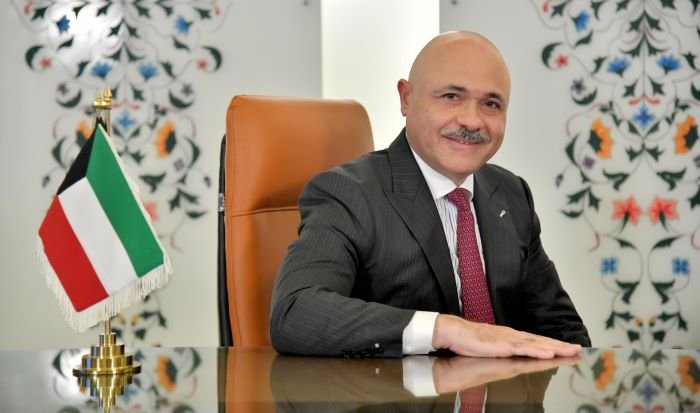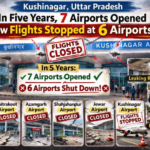
BY MOHAMMAD TARIQUE SALEEM
In a pivotal tete-e-tete, H.E. Mr. Meshal Mustafa Jasim Alshemali, Kuwait’s Ambassador to India, illuminates the bold leadership of His Highness Sheikh Meshal Al-Ahmad Al-Jaber Al-Sabah. Driving Kuwait Vision 2035, the Amir tackles stagnation through institutional reforms, anti-corruption measures, and oil diversification, prioritizing healthcare, education, and infrastructure. This vision forged a historic Strategic Partnership with India during Prime Minister Narendra Modi’s December 2024 visit, the first in 43 years, honored by the Award of Mubarak Al-Kabeer. With over one million Indians comprising 21% of Kuwait’s population and 30% of its workforce, relaxed visas, worker protections, and post-Mangaf safety enhancements underscore a thriving diaspora. From trade surging to US$10.22 billion to collaborations in defense and renewables, Kuwait-India ties herald a decade of shared prosperity.

Q – Your Excellency, how do you see the leadership of the present Emir of Kuwait, His Highness Sheikh Meshal Al-Ahmad Al-Jaber Al-Sabah, his vision for the nation’s political and socio-economic development and his view about India?
A – His Highness Sheikh Meshal Al-Ahmad Al-Jaber Al-Sabah, the Amir of the State of Kuwait is pursuing a vision centered on implementing long-delayed reforms to address political and economic stagnation. A key focus is the modernization of state institutions to accelerate development, combat corruption, and reduce the nation’s heavy dependence on oil revenue. His Highness’s political vision is defined by his decisive steps to break through decades of institutional gridlock between the government and parliament. In May 2024, H.H dissolved parliament for up to four years and suspended some articles of the constitution. This was a direct response to political paralysis that had stalled the country’s development. H.H. the Amir’s socio-economic vision aligns closely with the goals of Kuwait Vision 2035, which aims to transform the country into a financial and commercial hub.
The vision includes accelerating development projects in critical public services, such as healthcare, education, housing and improving the quality and accessibility of public healthcare. H.H. the Amir holds a positive view of India, seeing it as a valued strategic and economic partner. Based on recent high-level meetings and diplomatic statements, this perspective was reinforced during Indian Prime Minister Shri Narendra Modi’s official visit to Kuwait on December 21-22, 2024, the first such visit in 43 years, where the relationship was elevated to a “Strategic Partnership”. During the visit, H.H the Amir and the Hon’ble Prime Minister affirmed their commitment to deepening and expanding bilateral cooperation. H.H expressed appreciation for India’s role as a “valued partner in Kuwait and the Gulf region”, and conferred upon Prime Minister Shri Narendra Modi the “Order of Mubarak Al-Kabeer,” Kuwait’s highest national award, symbolizing the high regard he holds for India’s leadership.
Q – Many Indian expatriates in Kuwait wish to bring their elderly parents or guardians for short visits. Are there any new developments or relaxations in the family visit visa policy ?
A – Yes, the State of Kuwait has introduced significant new developments and relaxations for its family visit visa policy, most notably by eliminating the minimum salary requirement for all legally residing expatriates. Other major changes include expanding eligibility to relatives up to the fourth degree by blood and third-degree in-laws, allowing visitors to enter the country via any airline and introducing online application processing for quicker approvals.
Q – How would you describe the present condition of Indian workers in Kuwait, particularly those employed in the construction, healthcare, and domestic sectors?
A – A large and well-established Indian community of over one million people provides strong social and cultural networks for new and existing workers. Indian workforce constitutes 21% of the total population of Kuwait and 30% of its work-force. A large number of Indians work in semi-skilled and unskilled jobs, including carpentry, construction, driving, domestic help, and even food and courier delivery services. Indian workforce in Kuwait is considered hard-working, trust-worthy and non-interfering by nature. Indian businessmen, entrepreneurs, doctors, engineers, paramedics, nurses etc. are kept in high esteem and remains a community of first preference for Kuwait.
Q – What steps is the Kuwaiti government taking to ensure fair wages, improved living conditions, and stronger legal protection for expatriate workers ?
A – The government of the State of Kuwait has taken many steps to address the rights and conditions of expatriate workers through new laws and policies, including establishing minimum wages and launching new housing projects. The government mandates that all private sector salaries be paid through Kuwait’s Wage Protection System (WPS) via electronic bank transfers, ensuring timely and transparent wage payments. The government is constructing 12 new residential complexes for expatriate workers. This initiative aims to relocate workers from overcrowded residential areas into more organized and sustainable facilities, while the new foreign residency law aims to better regulate expatriate housing, enhance social and security stability and work conditions and includes stricter penalties for residency trafficking.
Q – How do you view the role and contribution of the Indian expatriate community toward Kuwait’s socio-economic development ?
A – Indian workforce constitutes 21% of the total population of Kuwait and 30% of its work-force. There are over one million Indian workers residing in Kuwait and working in Private Sector as well as Domestic Sector and thus contributing to the socio-economic development of the State of Kuwait. The Indian expatriate community has contributed significantly to Kuwait’s socio-economic development through its role in infrastructure, the oil and gas sector, healthcare, and commerce. Indians are the largest expatriate group in Kuwait and their labor provides essential services, while businesses establish a strong presence in retail and distribution, which enriches the local economy and caters to both the Indian diaspora and the wider population. Furthermore, the community acts as a cultural bridge, enhancing bilateral ties through a strong diaspora presence, educational institutions, and cultural exchanges.
Q – The recent Mangaf fire tragedy raised concerns over safety standards in workers’ accommodations. What measures has the Kuwaiti government adopted since then to enhance worker safety and prevent similar incidents ?
A – Following the deadly fire that broke out in Mangaf in June 2024, the Kuwaiti government took several measures to enhance worker safety, crack down on violations, and prevent future incidents. Kuwait Authorities launched extensive inspection campaigns targeting illegal properties and overcrowded worker housing, particularly in areas with large numbers of expatriate laborers. The goal was to identify and rectify violations of building codes and safety regulations. The Public Relations and Media Department of the Kuwait Fire Force issued strict new advisories for property owners. They were urged to adhere to fire safety standards, ensure emergency exits remain clear, and stop renting properties to large groups of workers. The Government of the State of Kuwait ensures that all worker accommodations meet international safety standards in order to prevent similar incidents in future.
Q – How is Kuwait strengthening its safety regulations and emergency response systems to protect both citizens and expatriates ?
A – Kuwait is strengthening its safety regulations and emergency response systems through new laws, technology, and inter-agency coordination. Recent reforms address a wide range of issues, from resident visas and labor laws to road safety and environmental concerns. The State of Kuwait has updated decades-old laws to improve safety and management of its population, with specific impacts on expatriates. The government is leveraging advanced technology to improve public safety and security. The Ministry of Interior is using artificial intelligence (AI) cameras on roads to detect traffic violations such as using a mobile phone while driving or failing to wear a seatbelt. The State of Kuwait has enhanced its ability to respond to various emergency situations by coordinating its public services and military. Emergency teams from the Ministry of Public Works, the Kuwait Fire Force (KFF), and other agencies are deployed during heavy rainfall to manage floods, control traffic, and perform rescue operations.
Q – How do India and Kuwait coordinate on issues concerning the welfare and protection of Indian nationals residing in Kuwait ?
A – India and Kuwait coordinate on the welfare and protection of Indian nationals through diplomatic channels, bilateral agreements, and the Embassy of India in the State of Kuwait. A comprehensive framework of cooperation, developed over years of close ties, addresses the needs of the largest expatriate community in Kuwait. There is an existing mechanism of a Joint Working Group (JWG) on Labour, Employment and Manpower Development, which has been meeting regularly to discuss the workforce issues and to improve the manpower condition. The 7th JWG meeting was held virtually in 2021. The meeting reviewed cooperation on issues such as the welfare of Indian workers, including domestic workers, nurses, and engineers in Kuwait, and explored ways to deepen this cooperation.
Q – Could you elaborate on any recent discussions or agreements between the Kuwaiti and Indian governments regarding labour mobility, skill development, or mutual recognition of professional qualifications ?
A – Recent high-level engagements between Kuwait and India have strengthened bilateral cooperation. Both governments have expressed a mutual interest in partnering for skill development, especially as Kuwait diversifies its economy and India positions itself as a global hub for skilled talent. A visit by Hon’ble Prime Minister of India Shri Narendra Modi to the State of Kuwait in December 2024 underscored the importance of Indian manpower to Kuwait’s development. The Indian Prime Minister recognized the contribution of Indian professionals and workers to Kuwait’s socio-economic growth.
The Government of Kuwait has introduced new visa rules allowing expatriates working in domestic sectors to transfer their visas to the private sector under specific conditions. This move is likely to benefit Indian workers in Kuwait and aims to streamline labor mobility while adhering to the nation’s legal framework. The Institute of Chartered Accountants of India (ICAI) and the Kuwait Accountants and Auditors Association (KAAA) signed a Memorandum of Understanding (MoU) in 2019 to improve technical cooperation between both the countries. This MoU focuses on collaboration and strengthening the accounting and financial knowledge base in Kuwait and may lead to future developments in mutual recognition of professional qualifications.
Q – What initiatives has the Kuwaiti Embassy in New Delhi undertaken to further enhance consular and visa facilitation for Indian citizens ?
A – The embassy continually develops mechanisms to overcome obstacles faced by individuals seeking to visit Kuwait for work or tourism, in coordination with the relevant authorities. The procedures are carried out routinely in accordance with the established and agreed-upon protocols between the two countries.
Q – India and Kuwait share decades of strong diplomatic, economic, and cultural ties. How do you assess the current phase of bilateral relations between our two nations ?
A – I would like to underline the importance of deep-rooted historical relations between the State of Kuwait and the Republic of India. Kuwait and India share centuries-old ties, with maritime trade forming the backbone of their historical relationship. The Indian Rupee was once legal tender in Kuwait until 1961, symbolizing the enduring economic and cultural bond between the two nations. Diplomatic relations were formally established in 1961, which further solidified this partnership. Both countries always stood with each other during the difficult times and look forward to work together to build upon this extra ordinary foundation.
It is a moment of pride for both the countries and their friendly people as they share a vast history of relationship in various fields. Kuwait-India relations have always had an important trade and economic dimension. India has consistently been among the top trading partners of Kuwait, with a total bilateral trade reaching US$ 10.22 billion during FY 2024-2025. Kuwait remains a reliable supplier of crude oil & Liquefied petroleum gas (LPG) to India, meeting crucial energy needs of the country. During the same period, Kuwait was the 6th largest crude supplier and 5th largest supplier of Liquefied Petroleum Gas (LPG) to India, meeting about 3.5% of India’s total energy needs.
Q – After 43 years, a potential visit by Indian Prime Minister Narendra Modi to Kuwait is being discussed. How significant would such a visit be in shaping the future of India–Kuwait relations ?
A – The recent historic visit of His Excellency Shri Narendra Modi, the Prime Minister of the Friendly Republic of India, to the State of Kuwait during the period from December 21-22, 2024, marks the first visit by an Indian Prime Minister to the State of Kuwait in 43 years. During the visit, both nations elevated their relationship to a strategic partnership, and the MoUs on Cooperation in the field of Defence, Cultural Exchange Programme for the years 2025-2029 and Executive Programme for Cooperation in the Field of Sports (2025-2028) were signed. Kuwait also signed the Treaty of International Solar Alliance (ISA) in Dec 2024 and ratified the agreement in May 2025. I am confident that this visit will consolidate partnerships in existing areas such as energy, trade and food security, while also exploring new avenues for collaboration in defense and investment and unveil new avenues for cooperation, reinforce shared values, and build a stronger partnership for the future.
Q – Beyond labor cooperation, what are some of the promising areas for bilateral investment and trade that both countries are currently exploring ?
A – India has consistently been among the top trading partners of Kuwait. With regard to investment, the State of Kuwait has invested heavily in India, with cumulative FDI inflows from Kuwait to India amounting to US$ 10.1 billion as of March 2023. Kuwait is also committed to attracting more Indian investment and talent, and for this, it recently launched a new investment promotion strategy that is specifically targeting Indian investment in a variety of sectors, including infrastructure, manufacturing, and tourism. There are too many opportunities in the area of trade and economic cooperation between Kuwait and India, such as to encourage the use of local currencies (Kuwaiti Dinar-Indian Rupee) for cross-border transactions including trade, remittance, and investment flows, which will likely to benefit over 1 million Indians living in Kuwait, and travelers between the two countries.
I believe that concluding free trade negotiations between the GCC countries and the Republic of India is of utmost important, as it will provide opportunities for Kuwait and India to increase the volume of bilateral trade and investment. Both the friendly countries have discussed joint-venture projects in recent years in order to establish new facilities in the oil and gas sector, as there are significant opportunities for further strengthening ties in this sector. I hope that ongoing government actions to facilitate investment in both directions and open new sectors to private investment will continue to accelerate the economic growth, development, and increased prosperity that our deep economic engagement has delivered to both nations.
Q – Your Excellency, what is your vision for the next decade of Kuwait–India relations in light of global economic changes and the evolving Gulf–Asia partnerships ?
A – The vision for the next decade of Kuwait-India relations is a comprehensive strategic partnership that moves beyond a traditional buyer-seller relationship in the energy sector to embrace diversified collaboration in technology, infrastructure, food security, and defense. This vision is driven by global economic changes, specifically the need for economic diversification (Kuwait’s Vision 2035) and India’s rapid economic growth and technological advancements (Viksit Bharat 2047 mission). Kuwait’s Vision 2035 offers India an opportunity to collaborate in emerging fields such as renewable energy, infrastructure, and technology. This aligns with India’s Vikshit Bharat 2047 mission, which envisions transforming the nation into a developed economy by its centenary of independence.
Kuwait’s geographic position makes it a key player in the geopolitics of West Asia. Strengthening ties with Kuwait provides India with a stable partner in the region. As both nations share concerns over regional security and counter-terrorism, they agree to enhance intelligence sharing and law enforcement cooperation to ensure stability in the volatile West Asia region. Moreover, the Gulf’s growing influence in global diplomacy, particularly within the United Nations, adds to the strategic importance of this partnership. In essence, the future vision anticipates a multi-faceted and resilient partnership, driven by mutual economic and strategic needs and adapting to the evolving global landscape by focusing on sustainable, knowledge-driven growth.







